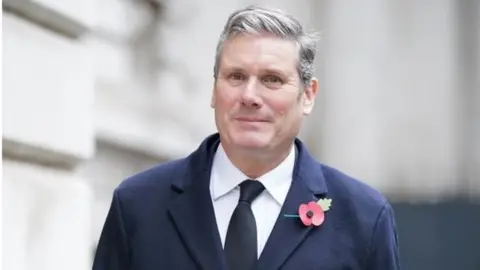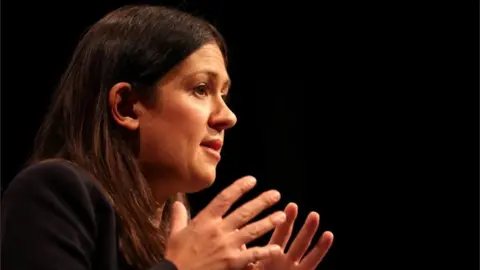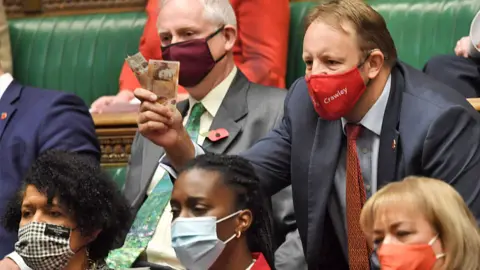Labour to hold vote on banning some second jobs for MPs
 PA Media
PA MediaLabour will hold a vote on Wednesday on banning MPs from taking paid directorships or consultancies.
Party leader Sir Keir Starmer has argued that a ban on certain second jobs would help end "dodgy lobbying".
It comes as MPs are likely to endorse the report criticising ex-Tory MP Owen Paterson for lobbying ministers on behalf of firms who were paying him.
On Sunday, Prime Minister Boris Johnson acknowledged Mr Paterson's case could have been handled "better".
Mr Paterson had denied wrongdoing, and the government initially tried to change the process that had found the MP guilty.
However, following a fierce backlash, ministers U-turned on the plans and Mr Paterson stepped down as the MP for North Shropshire.
His case has prompted concern over the work MPs take on outside of their parliamentary job.
Speaking to LBC, Sir Keir said some jobs - such as working in a hospital or as a reserve police officer - were acceptable but that "beyond that the time has come to say second jobs should go".
He said paid consultancies created a "potential for a conflict of interest" but that the ban shouldn't be applied retrospectively.
Currently, more than 200 MPs have declared additional earnings on top of their MPs' salary in the past year.
Conservative Sir Geoffrey Cox is among the highest earners having accrued almost £900,000 for his legal work.
Conservative party chair Oliver Dowden told the BBC the government was "constantly improving standards" adding that: "The prime minister has been very clear that Members of Parliament should be getting on with their day job."
Asked if the government would support Labour's efforts to ban certain second jobs, the prime minister's spokesperson said it would be a matter for the House of Commons.
Labour plans to propose the debate and vote on second jobs in the House of Commons on Wednesday, but the text of the motion to be debated has not yet been confirmed.
 Reuters
ReutersMeanwhile, Labour has asked Lord Geidt - the independent adviser into ministers' interests - to investigate claims Transport Secretary Grant Shapps lobbied against government plans to build homes on airfields.
The Sunday Times reported that Grant Shapps - a keen recreational pilot - set up the publicly funded Airfield Advisory Team (AAT) - a body which support airfields challenging planning developments.
The transport department said it was "right" for Mr Shapps to "promote all aspects of the department's brief including the general aviation sector, which contributes £4bn to the economy".
In the past the AAT has expressed concern about a housing development on Chalgrove Airfield in Oxfordshire and plans to build a gigafactory for electric car batteries on the site of Coventry Airport.
Labour's Lisa Nandy described the minister's action as "murky" adding "the allegations that have been made about the transport secretary is that he has paved the way for public money to be spent on lobbying that will benefit himself personally".
The independent adviser Lord Geidt can raise potential breaches of ministers' code of conduct, but can only launch an investigation if requested to by the prime minister.
Asked if this should change, Conservative Party Chair Oliver Dowden told the BBC's Today programme he believed the current adviser was sufficiently independent of the PM.
But he added that the prime minister should "be able to determine who is in his Cabinet".
In November 2020, the prime minister's then-adviser on ministers' interests resigned after Boris Johnson backed Home Secretary Priti Patel over a bullying inquiry.
 UK Parliament
UK ParliamentOn Monday evening, MPs will be able to debate and vote on the original report into Mr Paterson's conduct.
The motion also formally scraps the government's efforts to review the current standards system.
However, if other business in the House of Commons overruns, there may not be time for a full debate and the motion could simply be nodded through.
Commons Speaker Sir Lindsay Hoyle said he hoped Monday's vote would allow MPs to "move beyond" what he called "one of the darkest weeks we've had in parliamentary history".
